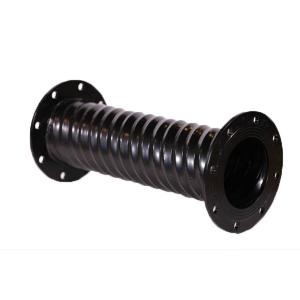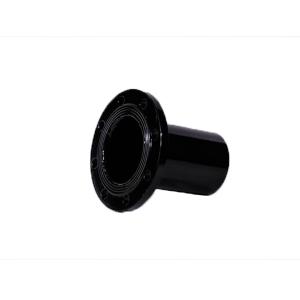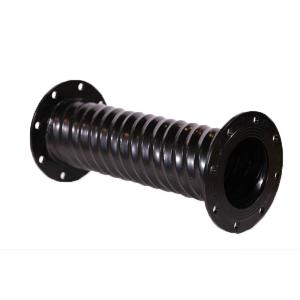Underground Epoxy Coated Spiral Welded Corrugated Composite Steel Pipe for Mining
- Loading Port:
- China main port
- Payment Terms:
- TT or LC
- Min Order Qty:
- 10 m
- Supply Capability:
- 10000 m/month
OKorder Service Pledge
OKorder Financial Service
You Might Also Like
Underground Epoxy Coated Spiral Welded Corrugated Composite Steel Pipe for Mining
Press grade: Maximum PN -0.097MPa
Size: DN200MM-DN800MM
Features:

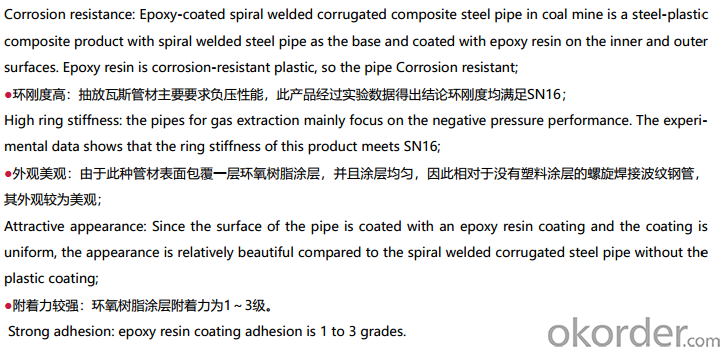
Specification
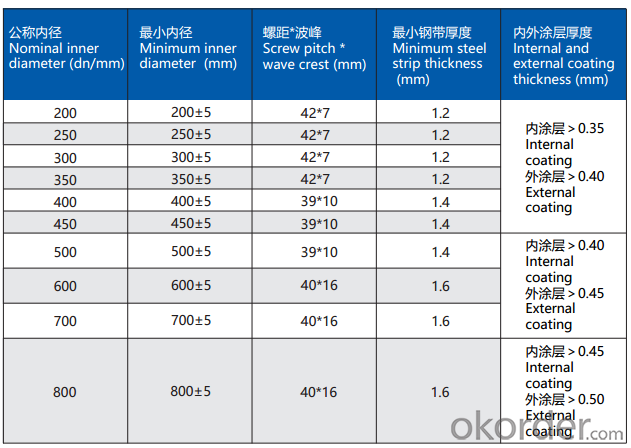
We own three industry bases for manufacturing pipes, fittings and new materials, including the biggest production line of steel wire reinforced PE composite pipe in the world, and top advanced PE pipe production line.
We get long term cooperation with leading material suppliers in the world and professionally provide the pipeline system solutions of matched products and technical cases by the whole industry chain from materials R&D to pipeline engineering installation.
- Q:What is the difference between steel pipes and polyethylene pipes?
- Steel pipes and polyethylene pipes are two types of piping materials that have different characteristics and uses. Steel pipes are made of a durable and strong material, making them suitable for high-pressure applications and transporting fluids or gases. They have a high resistance to heat, corrosion, and impacts, making them ideal for industrial and heavy-duty applications. Steel pipes are commonly used in industries such as oil and gas, construction, and infrastructure projects. Polyethylene pipes, on the other hand, are made of a flexible and lightweight plastic material known as polyethylene. They are commonly used for underground water supply systems, irrigation, and drainage systems. Polyethylene pipes have excellent resistance to chemicals, making them suitable for transporting water and other fluids. They are also more affordable and easier to install compared to steel pipes. In summary, the main difference between steel pipes and polyethylene pipes lies in their material composition, strength, and applications. Steel pipes are stronger and suitable for high-pressure applications, while polyethylene pipes are flexible, lightweight, and commonly used for water supply and drainage systems.
- Q:What does cathodic protection of steel tubes mean?
- There are two ways of cathodic protection: sacrificial anode, cathodic protection and impressed current cathodic protection.Sacrificial anode: connect a living metal or alloy to a protective metal to form a galvanic cell. The active metal replaces the protected metal to lose electrons so that the protected metal is not corroded.
- Q:What's the difference between straight steel pipe and seamless steel pipe?
- Seamless steel pipe and welded pipe are separated because of different production process. Seamless steel tubes include hot rolling, cold rolling, cold drawing, and other rare, such as cold extrusion.
- Q:Can steel pipes be used for transporting liquids?
- Yes, steel pipes can be used for transporting liquids. Steel pipes offer excellent strength, durability, and resistance to corrosion, making them suitable for various applications, including the transportation of liquids such as water, oil, and gas.
- Q:Can steel pipes be used for oil and gas well production?
- Yes, steel pipes can be used for oil and gas well production. Steel pipes are commonly used in the oil and gas industry due to their strength, durability, and resistance to corrosion. They are able to withstand high pressure and extreme temperatures, making them suitable for transporting and extracting oil and gas from wells.
- Q:How do steel pipes handle ground settlement?
- Steel pipes are known for their strength and durability, making them capable of handling ground settlement effectively. Due to their rigid nature, steel pipes are resistant to deformation or collapse caused by uneven settling of the ground. This makes them a reliable choice for underground installations, as they can withstand and navigate through the changes in the ground surface without compromising their structural integrity.
- Q:What is the role of steel pipes in the transportation of chemicals?
- The role of steel pipes in the transportation of chemicals is to provide a strong, durable, and corrosion-resistant conduit for safely moving various types of chemicals from one location to another. Steel pipes are known for their high strength and ability to withstand high pressure, making them suitable for handling hazardous or aggressive substances. Additionally, the smooth interior surface of steel pipes minimizes friction, allowing for efficient and continuous flow of chemicals. The steel material is also resistant to chemical reactions, ensuring the integrity and purity of the transported substances. Overall, steel pipes play a crucial role in ensuring the safe and efficient transportation of chemicals, protecting both the environment and human health.
- Q:How are steel pipes protected against electrolytic corrosion?
- Steel pipes are protected against electrolytic corrosion through various methods such as applying protective coatings, using sacrificial anodes, implementing cathodic protection systems, or utilizing corrosion inhibitors. These measures help to prevent the flow of electric current and the subsequent corrosion caused by electrolysis, ensuring the longevity and integrity of the steel pipes.
- Q:Can steel pipes be used for conveying solid materials?
- Yes, steel pipes can be used for conveying solid materials. Steel pipes are known for their durability and strength, making them suitable for transporting various solid materials such as ores, grains, coal, and construction materials. The smooth interior of steel pipes allows for efficient flow and minimal friction, making them a preferred choice in industries like mining, agriculture, and construction.
- Q:How are steel pipes used in the defense sector?
- Steel pipes are used in the defense sector for various purposes such as constructing military infrastructure, manufacturing weapons, and creating protective barriers. They are often utilized in the construction of military bases, ammunition storage facilities, and communication systems. Steel pipes are also crucial for manufacturing armored vehicles, artillery, and missile systems. Additionally, they are employed in creating barriers and fortifications to enhance security and defense capabilities.
1. Manufacturer Overview |
|
|---|---|
| Location | |
| Year Established | |
| Annual Output Value | |
| Main Markets | |
| Company Certifications | |
2. Manufacturer Certificates |
|
|---|---|
| a) Certification Name | |
| Range | |
| Reference | |
| Validity Period | |
3. Manufacturer Capability |
|
|---|---|
| a)Trade Capacity | |
| Nearest Port | |
| Export Percentage | |
| No.of Employees in Trade Department | |
| Language Spoken: | |
| b)Factory Information | |
| Factory Size: | |
| No. of Production Lines | |
| Contract Manufacturing | |
| Product Price Range | |
Send your message to us
Underground Epoxy Coated Spiral Welded Corrugated Composite Steel Pipe for Mining
- Loading Port:
- China main port
- Payment Terms:
- TT or LC
- Min Order Qty:
- 10 m
- Supply Capability:
- 10000 m/month
OKorder Service Pledge
OKorder Financial Service
Similar products
New products
Hot products
Related keywords
